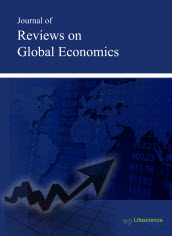The Impact of Knowledge-Based Economy on Growth Performance: Evidence from South Africa
Keywords:
Growth, performance, knowledge-based economy, South Africa.Abstract
This article seeks to measure and evaluate the impact of knowledge-based economy on growth performance in South Africa. The study focuses in identifying specific economic pillars that enhance growth performance in South Africa. Although transition from traditional to knowledge-based economy appears structural, the course to digital innovation guides adaptation to the global change. Following the World Bank KAM (knowledge assessment methodology), this article uses data analysis from the 2007 to 2016 to highlighted economic transition in the recent decade. This article uses quantitative methods to analyse secondary data collected from various websites such as SA Statistics, organisation for the Economic Cooperation and Development (OECD) as well as the World bank that publish South African economic data. Data analysis is done using SPSS software version 26 as a major statistical tool for advance data interpretation. However, the study is limited to yearly data frequency compared to quarterly or monthly frequency since statistical data are mostly published per year. The empirical results showed that 67% of GDP (Gross Domestic Product) is explained by the dependent variables namely FDI 9Foreign Direct Investment), R&D 9Research and Development), trade ICT (Information, Communication and Technology) and Computer balance as well as literacy. Innovation system, economic regime, information infrastructure as well as human resources’ elements are statistically significant in improving economic growth in South Africa with a correlation matrix of 81%. Data interpretation showed that transition from traditional to knowledge-based economy is a key driver of national economic prosperity that guarantees long-term survival. Suggestions from the study stipulates that decision-makers should ensure efficiency of knowledge-based economy structure through definition and application of knowledge-related policies tailored to the country’s specifications. The proposed conceptual framework will guide the implementation of successful knowledge-based economy that will enrich growth performance in South Africa.
Downloads
Published
How to Cite
Issue
Section
License
Policy for Journals/Articles with Open Access
Authors who publish with this journal agree to the following terms:
- Authors retain copyright and grant the journal right of first publication with the work simultaneously licensed under a Creative Commons Attribution License that allows others to share the work with an acknowledgement of the work's authorship and initial publication in this journal.
- Authors are permitted and encouraged to post links to their work online (e.g., in institutional repositories or on their website) prior to and during the submission process, as it can lead to productive exchanges, as well as earlier and greater citation of published work
Policy for Journals / Manuscript with Paid Access
Authors who publish with this journal agree to the following terms:
- Publisher retain copyright .
- Authors are permitted and encouraged to post links to their work online (e.g., in institutional repositories or on their website) prior to and during the submission process, as it can lead to productive exchanges, as well as earlier and greater citation of published work .


